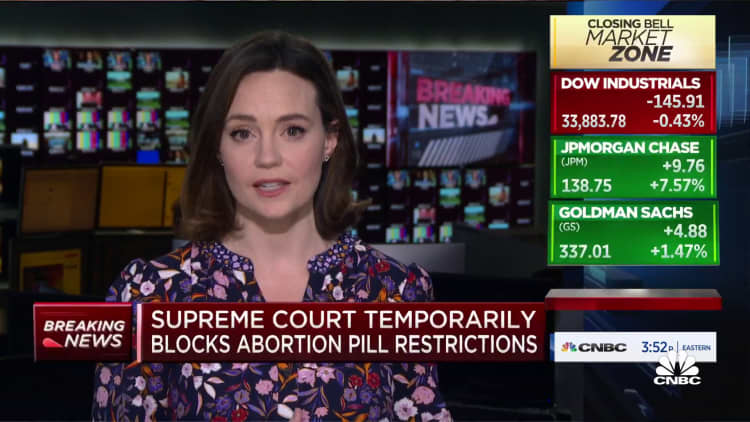

U.S. Supreme Court Justice Samuel Alito on Friday temporarily blocked lower court rulings that imposed tighter restrictions on the abortion pill mifepristone.
U.S. Judge Matthew Kacsmaryk of the U.S. Northern District of Texas suspended the Food and Drug Administration’s approval of mifepristone last week.
The U.S. 5th Circuit Court of Appeals blocked that part of Kacsmaryk’s order and kept the FDA approval in place. But the appeals court temporarily re-imposed tighter restrictions on how mifepristone is used and distributed, which would make it more difficult for women to access the drug.
Alito blocked those rulings restricting mifepristone access until 11: 59 p.m. ET Wednesday. The Alliance Defending Freedom and the Alliance for Hippocratic Medicine, the antiabortion groups who sued the FDA, are required to file their response by noon ET Tuesday.
The Supreme Court, which has a 6-3 conservative majority, will next decide whether to keep mifepristone more broadly available as the Biden administration’s appeal plays out. But the court could also vote to put the limits back in place as the appeal is resolved.
The ultimate outcome of the national legal battle over mifepristone could sharply limit access to the medication, even in states where abortion remains legal. Mifepristone, used in combination with another drug called misoprostol, is the most common method to terminate a pregnancy in the U.S., accounting for about half of all abortions.
U.S. Solicitor General Elizabeth Prelogar said the litigation against the FDA “has been troubling at every level.” She said the lower court rulings are the first time judges have repealed the conditions of an FDA drug approval based on a disagreement over the agency’s judgement about safety.
“If allowed to take effect, the lower courts’ orders would upend the regulatory regime for mifepristone, with sweeping consequences for the pharmaceutical industry, women who need access to the drug, and FDA’s ability to implement its statutory authority,” Prelogar said.
Judges Kurt Engelhardt and Andrew Oldham of the 5th Circuit, who were appointed by former President Donald Trump, effectively rolled back every regulatory action the FDA has taken on mifepristone over the past 20 years.
The appeals court judges blocked mail delivery of mifepristone, re-imposed doctor visits as a condition of receiving the drug, and shortened the timeframe when women can take it to the seventh week of pregnancy. They also blocked the 2019 approval of the generic form of mifepristone made by GenBioPro.
The legal landscape surrounding mifepristone has become messy and uncertain over the past week. U.S. Judge Thomas Rice in the Eastern District of Washington issued a competing order that the FDA maintain access to mifepristone in 17 states and Washington D.C.
The U.S. government told the Supreme Court that abiding by the 5th Circuit restrictions would put it in violation of the Washington state district court order.
The Justice Department said the Texas and appeals court rulings would make all doses of mifepristone on the market misbranded because their labelling wouldn’t be consistent with the 2000 FDA approval. The government said it would take months to readjust the labelling, which would deny women access to drug that the FDA approved as a safe and effective alternative to surgical abortion.
Danco Laboratories, the distributor of the abortion pill, said it would not be able to market mifepristone until the FDA takes a series of actions to implement the lower court rulings.
“The direct consequence of the Fifth Circuit’s ruling is that FDA must effectuate a series of extensive approvals to implement the Fifth Circuit’s rollback. Without those approvals, Danco cannot legally market and distribute mifepristone,” wrote Jessica Ellsworth, the company’s attorney.